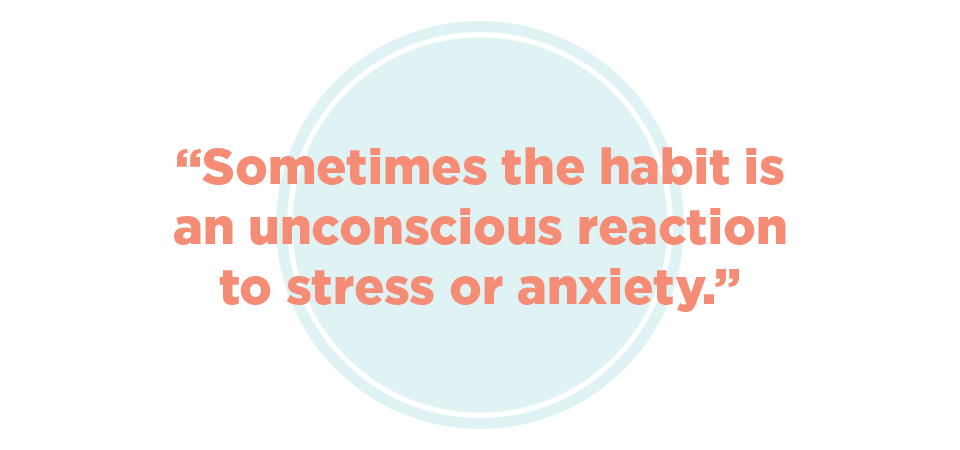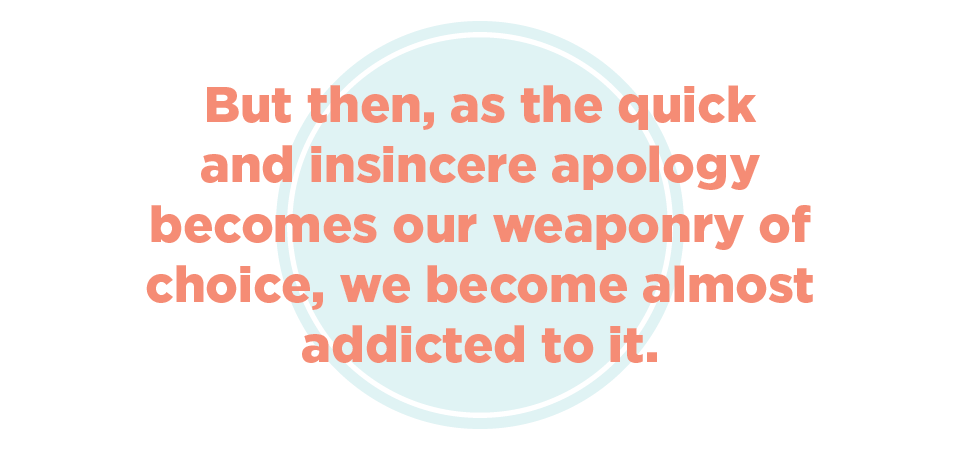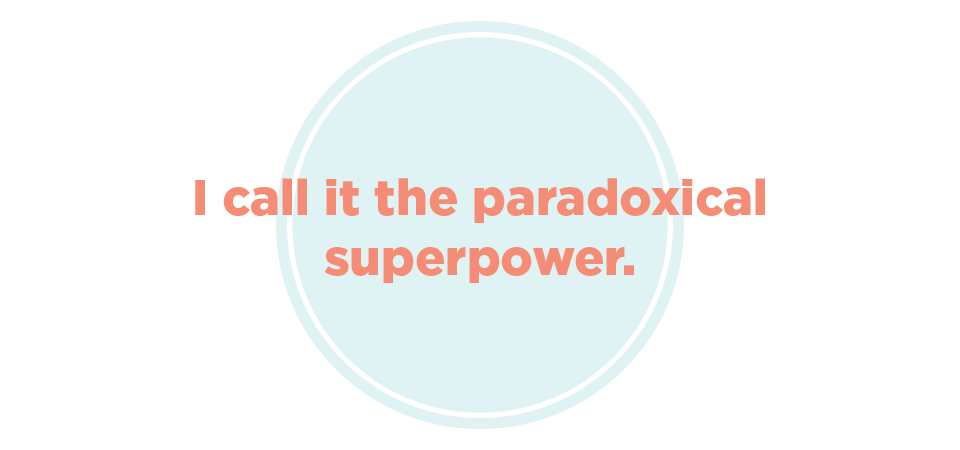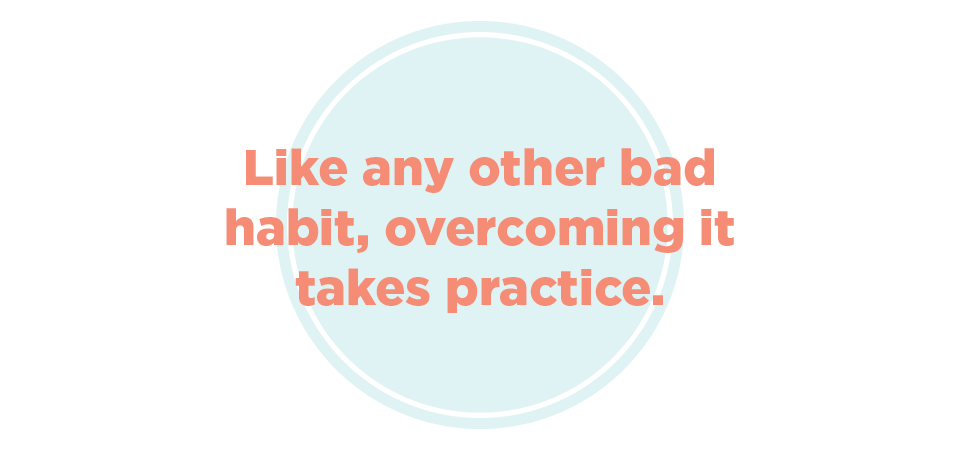If you’re someone who knows the value of a good apology—not just for mending fences but also for strengthening relationships in every area of life—you’re way ahead of most people.
The habit of injecting the word “sorry” into every other sentence you utter might seem harmless on the surface. But it can undermine your authority and your
confidence, portray you as weak and indecisive, and even damage your credibility.
Worst of all, over-apologizing can desensitize your listeners when you want to deliver a
sincere and necessary apology. The more you say you’re sorry, the less power it has. Remember the boy who cried wolf? If everything rises to the need for an apology, then nothing does.
Recognizing the Problem
Do these casual (and unnecessary) apologies sound familiar?
- “Sorry, can you repeat that?”
- “I’m sorry, but I disagree.”
- “I have no available appointments this week. Sorry about that.”
- “I’m sorry, but I have to let you go.”
Though often
attributed to women, apologizing isn’t just a female problem. Psychologists tell us that people who compulsively apologize for small infractions may be manifesting anything from a nervous tic to a social disorder. Frequent apologizers may be insecure, introverted, or just overly self-conscious. They may have been raised in strict families or put a high value on getting along with everyone. Sometimes the habit is an unconscious reaction to
stress or anxiety.
More often, though, over-apologizing is an unconscious habit that’s annoying at best, and at worst, sends one or more unwanted messages that can really work against us:
- I’m not sincere.
- I’m afraid of you.
- I don’t trust you to give me what I want if I’m not super nice.
- I don’t think I’m good enough to talk to you, ask for anything, or even be here.
Diagnose Yourself
Ask yourself you’ve ever said you were sorry for any of the following:
- Saying no
- Winning
- Asking for a raise you deserve
- Getting angry about an injustice
- Having an opinion
- Feeling an emotion
- Crying
- Fainting
- Throwing up
- Being injured
- Tending to your own needs
Did you answer yes to four or more of the above? Read on.
Consequences of Too Much “Sorry”
If we don’t need to apologize for having an opinion, needing help, or just being human, then what are we trying to accomplish through this behavior?
Sometimes we apologize to deflect, in advance, a negative reaction to what we’re saying. It’s as if we’re trying to smooth ruffled feathers before the ruffling begins.
It’s true that an apology, especially
a sincere and necessary one, can actually take the heat off. The over-apology habit may begin innocently when we spontaneously apologize for a real offense. Our opponent softens or even backs down, saying, “Don’t worry about it, it’s nothing.” BAM! A magic bullet, we conclude. But then, as the quick and insincere apology becomes our weaponry of choice, we become almost addicted to it. Serving as both sword and shield, the frequent apology appears to disarm our opponent while protecting us from further attack.
So how do you break the habit?
Instead of Saying “I’m Sorry”
In all your communications, but especially on the job, be brief, specific, direct, and unapologetic. Simply state the problem and how you’ll fix it. And then shut up.
If you’re uncomfortable delegating scut work, try this:
“We’re in a crunch, and all these files need to be cataloged by end of the day. Do you have what you need to get started?”
If you’re constantly apologizing for what you can’t control, try this:
“I know I’ve had to reschedule this meeting several times. Thank you for understanding.”
If someone mistreats you and you start to get emotional, try this:
“Hey, that hurt,” or “That isn’t helpful.” You can even say, “I need a few minutes to collect myself,” and then leave the room.
Pro Tip: You can leave any room under these circumstances. Even if you’ve just been fired or
laid off. No apology necessary.
If something goes wrong on your watch, try this:
“The project took longer than I expected. I’ll have it for you first thing tomorrow.” Then stop.
Helpful Hint: If you missed a deadline because of
your own poor time management, then you should apologize. But don’t offer an apology on behalf of a team member or a difficult client.
Case Study: How to Spot When You DO Need to Apologize
A guy I’ll call Roy worked in the accounting department of my organization. Roy seemed to enjoy jerking my chain by routinely withholding information and taking forever to provide numbers I needed to do my job.
The showdown came one day when I needed some of Roy’s data to complete a report that was due on my CEO’s desk the next day. Roy informed me I’d have to wait a week. I’d had enough. Through clenched teeth, I said, “I’d hate to have to tell the CEO that his proposal got stalled on your desk.” The next morning I still had no report from Roy. Instead I had a note from human resources.
Apparently, in HR-speak, my remark amounted to a threat toward a subordinate, a
huge workplace blunder. Implying Roy’s job might be in jeopardy if he didn’t cooperate was, well, harassment. The HR director strongly suggested an apology to Roy would help me avoid any “unintended consequences.”
Deeply humbled, I swallowed my pride and went to Roy’s cubicle. I apologized for misusing my position to pressure him, and I showed appreciation for the thankless job he did every day. “I know you have a lot of conflicting priorities, and I was just trying to muscle my way to the top of the pile,” I said. “I’m sorry I did that. It won’t happen again.”
I had Roy’s report that afternoon, and ever afterward he was pleasant and cooperative. That’s one of the magical things that can happen when you apologize appropriately. I call it the paradoxical superpower.
Transforming Weakness into Strength
Before we toss the baby out with the bathwater, it’s important to recognize several positive character traits behind the habit of over-apologizing. For instance, it may arise in someone with strong
empathy for others. Empathy—the ability to consider another’s point of view and understand the feelings she may be having—is rapidly becoming a critical soft skill. Someone who knows when and how to apologize appropriately has a huge advantage in the empathy column.
A study by researchers at Harvard and Wharton business schools showed that certain apologies can even increase trust.
So where does this leave the over-apologizer who wants to reform?
First, take comfort in the fact that you’re probably a good, considerate person who wants everyone to get along. You’re also likely to score highly on the empathy scale, a huge asset in business and life. What you don’t want is to appear to be afraid of the space you occupy, to be someone who lacks the courage of her convictions or who doesn’t feel entitled to
speak her mind.
Like any other bad habit,
overcoming it takes practice. You’ll try avoiding the words “I’m sorry” for a while, stumble, and get back on track. Try taking a friend or trusted co-worker into your confidence about what you’re trying to accomplish, and agree on a high sign she can give you if she hears you apologizing unnecessarily. Then, reward yourself for the effort.
And keep at it. What you lose by giving up the emotional currency of frequent apologies, you will gain back in
personal confidence and self-esteem. That’s something of real value.
Bottom line: Don’t apologize unnecessarily—know how to recognize when a sincere apology is necessary.















